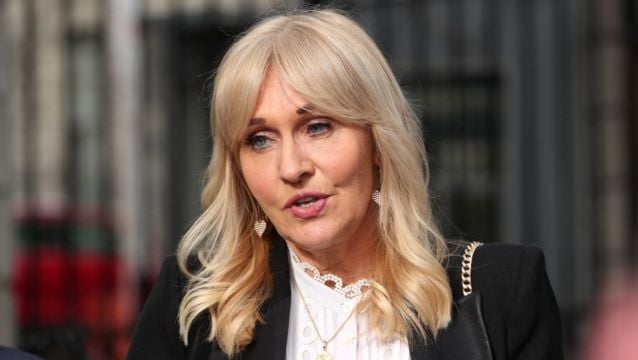Facebook Ireland has apologised unreservedly to broadcaster Miriam O’Callaghan over fake ads on the social media platform which used her name and image.
The Prime Time presenter received the unreserved apology as part of the settlement of her High Court action over several defamatory and untrue adverts that were posted on the social media platform.
Included in the settlement agreement, Meta Platforms Ireland, formerly known as Facebook Ireland, have agreed to establish an additional scam ad reporting tool, which will allow Irish users to submit reports on misleading adverts to a specialist team within Facebook for review.
Speaking after the settlement the broadcaster said it was "a good day" following a five-year battle over the misleading ads which she said had caused her distress, and had damaged her reputation.
Fake ads
She also expressed her delight that not only had the fake ads been taken down, but also over the fact Facebook are to introduce an additional tool which allows people to report scam ads.
In proceedings launched against Facebook Ireland three years ago Ms O'Callaghanclaimed she was defamed, and sought damages, in a series of false and malicious adverts containing her image and name on Facebook and Instagram in May 2018.
At the High Court on Friday Paul O'Higgins SC, instructed by solicitor Paul Tweed, for MsO'Callaghan said the matter had been settled against Facebook.
As part of the settlement Facebook Ireland’s counsel Joe Jeffers Bl read an agreed statement to the court, where it was acknowledged that the proceedings over the publication of misleading adverts published on Facebook by "malicious third parties" had been resolved.
"These adverts contained fabricated statements, which have been extremely damaging to Ms O'Callaghan. Meta Platforms Ireland accepts and regrets that the publication of these ads has caused Ms O'Callaghan distress and embarrassment, and regrets any wider concerns and distress caused by the ads."
"Meta Platforms Ireland apologises unreservedly to Ms O'Callaghan"
The statement added that the broadcaster is satisfied that the publication of the fake adverts, using her name and image, appears to have ceased.
Robust measures
The statement added that as a result of bring the action "Meta Platforms Ireland has undertaken to the broadcaster that it will use robust measures to tackle such advertisements in the future and will offer the ability within Ireland to report scam ads via an additional scam ad reporting tool."
Previously the High Court heard that the adverts at the centre of the action contained various misleading and defamatory headlines wrongly suggesting that Ms O'Callaghan has left her job with RTÉ's Prime Time.
Ms O'Callaghan said she had "nothing to do" with the adverts, which are linked to offers for skin care products.
She claimed that she most distressed at being associated against her will with what has been described as "a scam product," the court heard.
She claims the adverts have exploited the trust placed in her by the Irish public and have damaged her good name and reputation.
The paid for adverts, known as "targeted advertisements ", appear on social media user's newsfeeds, and are designed to encourage the user to click on the adverts.
Those who click on the adverts are offered various skin care products, which she said were falsely stated to be owned or endorsed by Ms O'Callaghan.
The pages also wrongly stated that she had left her position in RTE to focus on the promotion of the skincare range, it was alleged.
It was also claimed that users who avail of an offer of free trials of the skin care products have reported that had money debited from their bank accounts which they did not authorise.
Permanent injunction
Ms O'Callaghan also sought a permanent injunction restraining the publication of the adverts, as well as damages for malicious falsehood, unlawful appropriation of personality, various breaches of her constitutional rights and defamation.
During the course of her proceedings subsequently secured an order requiring the social media company to provide basic subscriber information, payment method details and business manager account information about those behind the adverts.
After obtaining that order Ms O'Callaghan'slawyers were able identified 51 individuals/names, with addresses in the United States and the Balkans who were joined as co-defendants with Facebook.
However it was not possible to identify any real persons, who were behind the fake ads, with that information.
Outside of court her solicitor Paul Tweed said his client welcomed the successful resolution of the broadcaster's proceedings.
The settlement he said had achieved his client's objectives of terminating the fake ads, vindicating Ms O'Callaghan's reputation, and has brought about something that will afford Irish Facebook users more protection.
The implementation of an addition reporting tool allowing Irish Facebook users to submit detailed reports of fake or scam ads was also a welcome development.
The tool will make such misleading material easier to report, he said, adding that such complaints will be dealt with by a specialist team within the social media giants,







